
We surveyed 700 Americans to explore the results of “the Harvey Weinstein Effect” and gauge how they feel about the allegations, work, and career prospects of the accused, and their own sexual experiences.
|
In 2016, over 1,000 major news headlines contained the phrases “sexual misconduct,” “sexual harassment,” and “sexual abuse allegations.” In 2017, there were over 7,000, totaling more than 5 million words. In fact, in the first eight weeks of 2018, there were as many sexual misconduct news stories as in the whole of 2016.1
Between October 2017 (when allegations about film producer Harvey Weinstein were widely reported) and February 2018, sexual misconduct accusations involving over 120 famous men were publicized for behavior ranging from inappropriate comments to rape.
The outing of Harvey Weinstein as a sexual predator created a watershed moment in the U.S. and across the world. Dozens of famous men’s reputations are now in tatters or purgatory, while the resulting #MeToo movement has inspired millions to share their personal stories and views on sexual harassment or assault.
Naming the Elephant in the Room
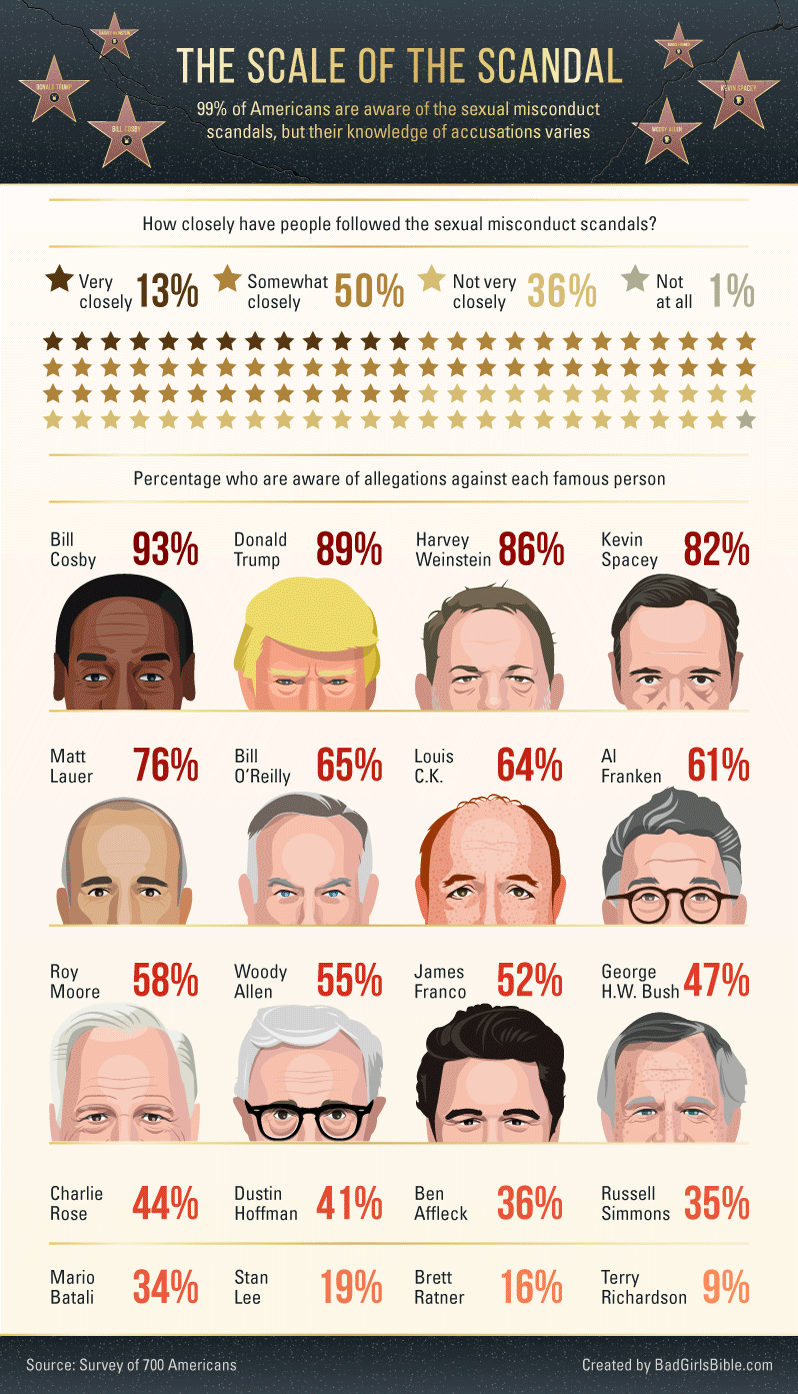
Ninety-nine percent of survey respondents said they were aware of the recent sexual misconduct accusations against famous men. Public conversation on the topic has evidently reached every corner of society: Since the Weinstein story broke in early October 2017, the 8,000 most read online news stories about sexual misconduct allegations have been shared on Facebook more than 27 million times.1 With at least 48 percent of Americans getting their news on Facebook, it’s easy to understand the viral spread of the scandal.
Despite being aware of the stories, not everyone has actively followed them. Thirteen percent said they tracked breaking sexual misconduct news “very closely,” while 50 percent said “somewhat closely.” Only 1 percent said they had “not at all” followed the unfolding narrative of at least one accused person.
Here we found no significant differences between age groups. Despite younger people consuming news differently than older people (preferring online sources to TV and newspapers), young and old alike were equally aware of the stories of sexual impropriety that have rocked multiple industries, including entertainment, literature and journalism, and politics.
We then asked if people were familiar with the details of accusations made against 20 of the most notable men who have experienced falls from grace in recent times. The list included actors (e.g., Kevin Spacey), presidents (e.g., Trump and Bush Sr.), journalists (e.g., Matt Lauer), and politicians (e.g., Roy Moore and Al Franken).
The sexual misconduct allegations against Bill Cosby were the most well-known by the public, with 93 percent saying they knew about them, followed by President Trump (89 percent), Harvey Weinstein (86 percent), and Kevin Spacey (82 percent).
The allegations against Bill Cosby, which include rape, drug-facilitated sexual assault, sexual battery, and child sexual abuse, stretch back further than most, but how recent allegations are seems to have less of an effect on public awareness than the fame of the person in question. For example, film producer Brett Ratner was accused of rape by one woman and sexual misconduct or harassment by six others. Around the same time, news broke about Kevin Spacey’s alleged sexual advances on actor Anthony Rapp. Despite being accused of similar misconduct, public awareness of the Spacey controversy is more than five times higher than of Ratner’s.
Political Affiliation Divides Trust in Sexual Misconduct Allegations
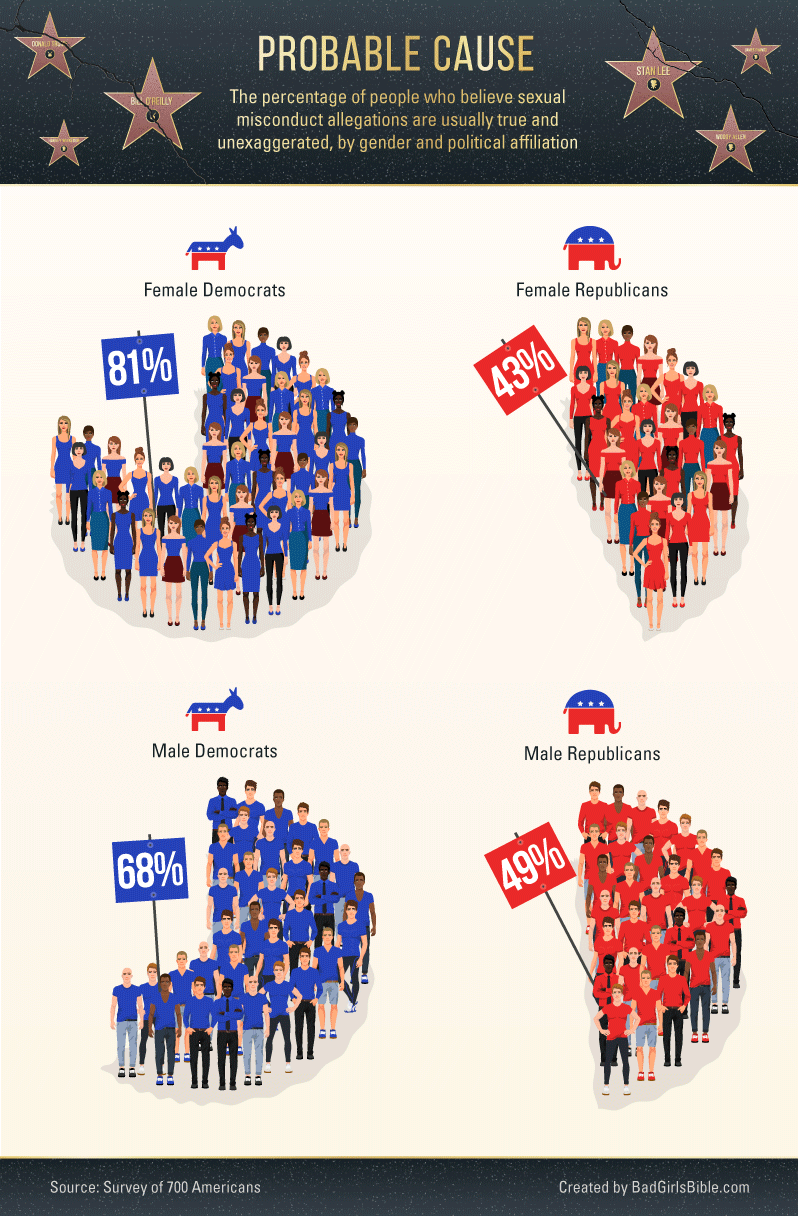
The flood of sexual misconduct stories involving famous men has inspired consciousness-raising movements like #MeToo and Time’s Up. These grassroots campaigns use social media to aggregate survivors’ stories of sexual violence and seek to increase awareness of the problem throughout society. On Facebook, #MeToo was used by more than 4.7 million people in the first 24 hours, with 45 percent of users having a friend who posted it.2
While #MeToo, Time’s Up, and the resulting “Believe Women” mantra have been widely commended, they have also been criticized by some for inciting a witch hunt – one that undermines the cause by targeting certain famous men whose actions, while contemptible if true, don’t amount to sexual assault (a prime case being that of comedian Aziz Ansari).
When we asked survey takers if they believed sexual misconduct allegations reported in the media were usually true and unexaggerated, 60 percent said “yes.”
Respondents’ ages didn’t make a significant difference, although women (63 percent) were a bit more likely than men (56 percent) to believe accusations.
The factor most connected to belief was political affiliation: Seventy-six percent of Democrats said they believed allegations usually to be true, compared to 45 percent of Republicans.
At first glance, this could be because Hollywood is largely left-leaning, but we also asked how often people believed sexual misconduct allegations made by regular women against non-famous men. The results were almost identical: 76 percent among Democrats and 43 percent among Republicans.
Just over 1 in 5 Americans identified as Republican in January 20183, which amounts to tens of millions of people doubting or withholding judgment on sexual misconduct claims. So how many separate allegations does it take against one famous man to make most people believe he’s guilty?
Is There Strength in Numbers for Victims of Sexual Misconduct?
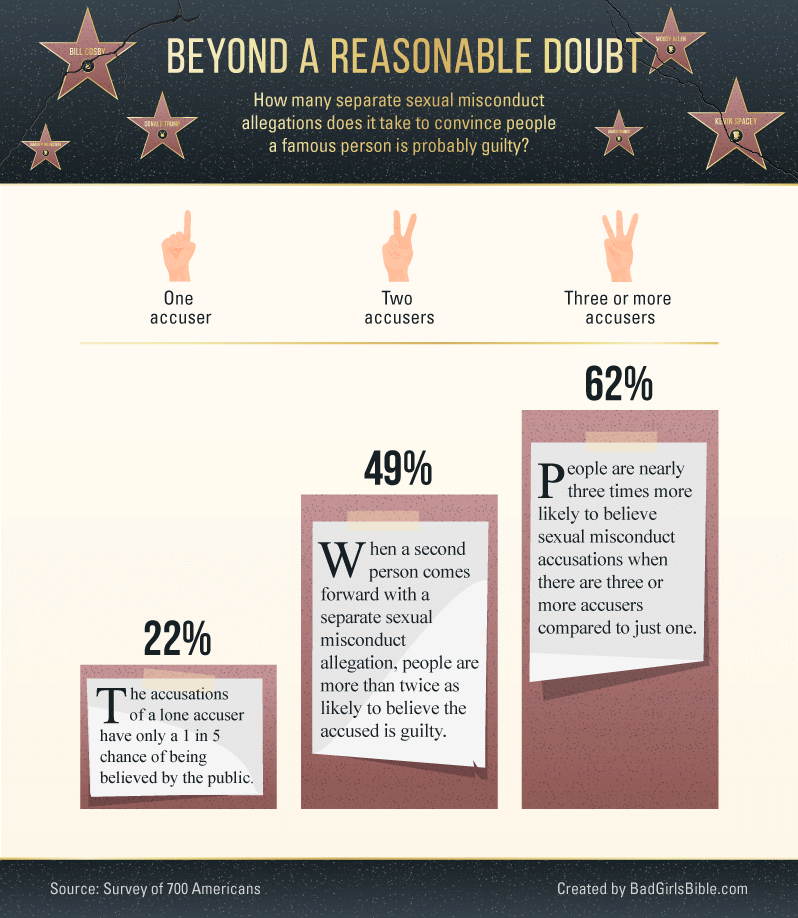
We asked how many separate allegations of sexual misconduct against a famous person it would take to make people feel the accused were “probably guilty.” Thirty-eight percent of people couldn’t put a number on it, either because they would never assume guilt without a stronger form of evidence than verbal account, or they simply couldn’t identify their tipping point.
Among those who did put a number on it, 22 percent said the accusation of one person was enough to convince them the accused was probably guilty When an additional person came forward with a separate allegation, nearly half of people believed the accused was probably guilty, and 62 percent of the public assumed guilt if there were three or more accusers.
Women were more likely than men to only need the account of a single accuser to condemn the accused (26 percent versus 19 percent). Again, the biggest difference in opinion was due to political affiliation. Twenty-eight percent of Democrats believed a famous person was probably guilty based on the accusation of one person, compared to only 9 percent of Republicans.
Using the number of separate sexual misconduct allegations to gauge the likelihood of guilt is fraught with problems. For decades, Harvey Weinstein had zero self-proclaimed and publicly named victims (which didn’t mean he wasn’t guilty of misconduct), whereas today he has more than 80. Some people consider the act of multiple women coming forward in quick succession to be jumping on the bandwagon, whereas others see it as finding strength in numbers. Whatever the case, even a single accusation in today’s media climate can wreak havoc on the accused’s career.
Shattered Reputations in the Court of Public Opinion
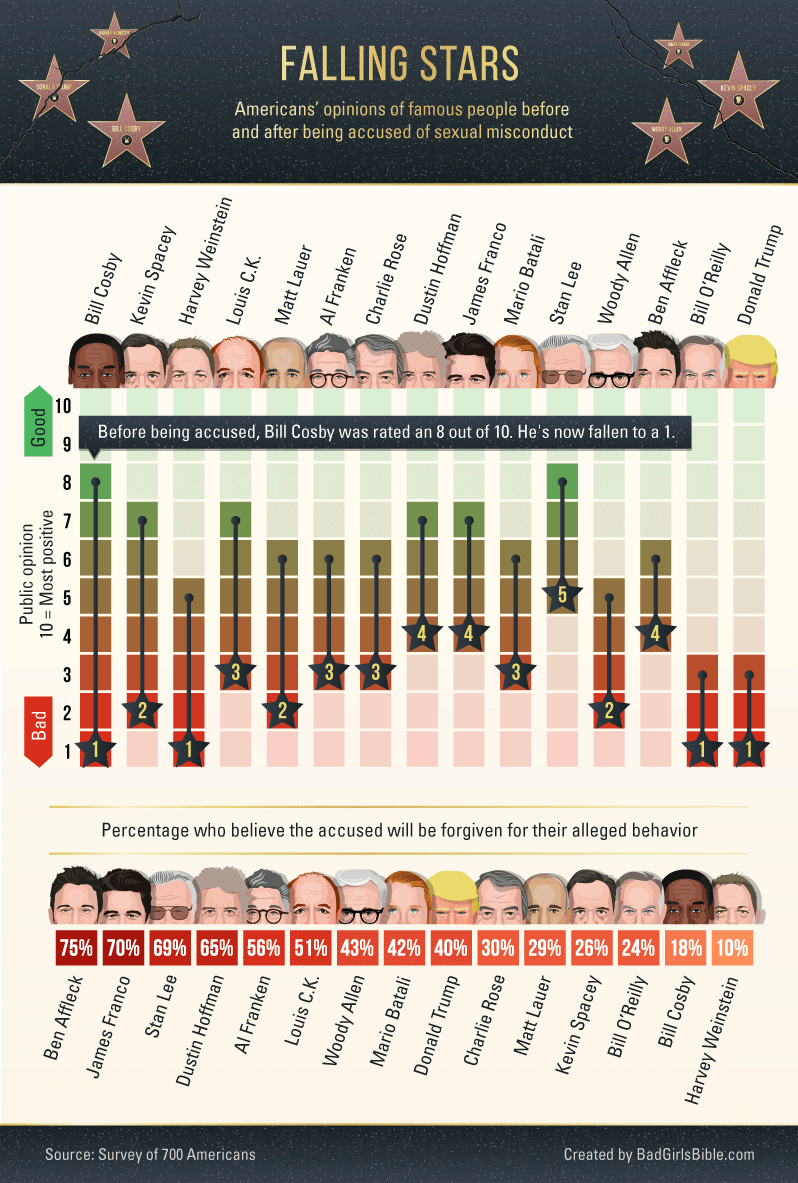
At the time of this writing, none of the 20 famous men featured above were convicted of sexual assault (although there are several ongoing criminal investigations), but all have suffered significant fallout from accusations of sexual misconduct or misbehavior.
We asked respondents to give their opinion of each famous man, with 10 being most favorable. On average, when Bill Cosby was perceived as the quintessential family man, he was rated eight out of 10. Post-allegations, he dropped to a one.
Bill O’Reilly and President Donald Trump are now also rated one, although before they were accused of sexual harassment and misconduct, they were only rated a three. Of course, political affiliation made a difference here. On average, Republicans rated Donald Trump a seven before the infamous “grab ‘em by the pussy” tape was released and a six afterward. In conservatives’ eyes, Bill O’Reilly fell from a six to a three. The severity of a celebrity’s sexual misconduct allegations and the degree to which they sour the public’s taste is about more than what he did or didn’t do – it also depends on how loved or unloved he was.
The accusations against the 20 men featured above vary considerably. Comedian Louis C.K. admitted to exposing his genitals to several women after asking if they minded, and fell from a favorability rating of seven to a three. On the other hand, comic book writer Stan Lee categorically denied sexual harassment of care nurses, which were anonymously reported and not backed by police reports or civil actions.
Despite the stark differences between their cases, both men fell three or four points in public favorability. With Cosby, Spacey, and Weinstein, the sheer volume and severity of allegations reliably translates into significant falls in public opinion, but any accusation – whether confirmed or denied, anonymous or identified – can damage a famous reputation.
The seriousness of accusations does make a difference to the public’s feeling on whether a celebrity will be forgiven for their alleged actions. Forgiveness in these cases could mean by the public, accusers, or even the accused’s family and friends – we left it open to our respondents’ interpretation.
Among people familiar with the individual accusations, 75 percent said Ben Affleck would be forgiven for the incident on TRL, in which he apparently grabbed the hostess’ breast. (They appear to be right, as he’s slated to act in or direct multiple major films over the next 24 months.) Harvey Weinstein’s fate is much less certain, as only 1 in 10 thought he would be forgiven. Kevin Spacey, who appears to have no new projects in the works, has a more than 1 in 4 chance of forgiveness, roughly the same as Bill O’Reilly and Matt Lauer.
Forgiveness is different than forgetting, and hundreds of TV episodes and movies are now potentially tainted by the alleged actions of their stars or producers. In the wake of such monstrous missteps, is it possible to separate art from the artist?
Sexual Misconduct Allegations Damage People’s Enjoyment of Art
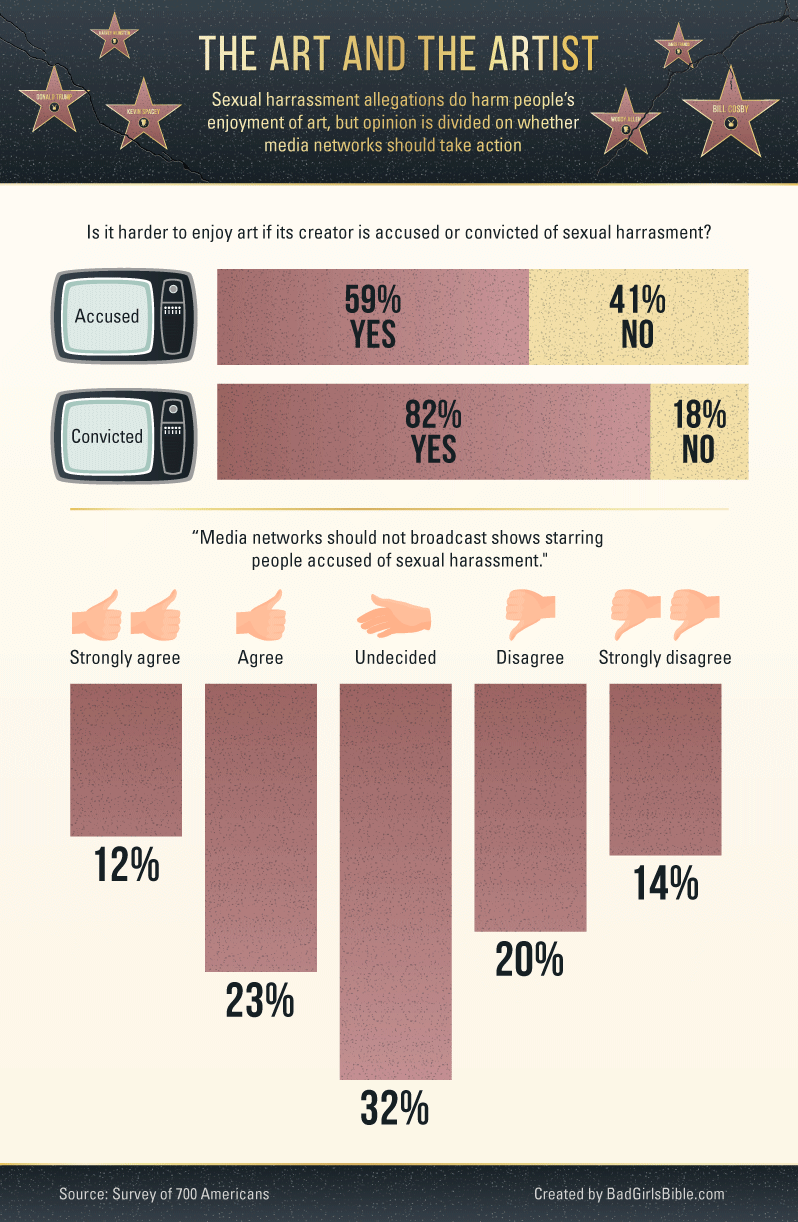
When an actor plays a despicable character in a TV show or film, the worst he can expect is to be typecast in future roles as a villain. However, if he’s accused of a despicable sexual act in real life, his entire back catalog of work can be colored by the allegations – merely seeing his face on the screen can turn him into a villain in any given role. This puts fans in a quandary: to distinguish between the art and artist or to boycott the artist’s work.
Fifty-nine percent of people said they found it harder to enjoy the work of a famous man after he was accused of sexual misconduct. This rose to 82 percent if he was eventually convicted. Women’s enjoyment of art created by or featuring accused men was more likely to be affected than men’s (64 percent versus 53 percent).
The fact that over 4 in 10 people said they could enjoy a film or TV show in spite of a key creative person, either on screen or off, being accused of sexual misconduct is interesting; several prominent writers have publicly discussed the dilemma. Perhaps this is why the public is so divided on whether TV networks and movie studios should cease broadcasting shows and films that feature accused men.
Nearly one-third of people said they were undecided on the matter, with 12 percent saying they strongly agreed networks should stop broadcasting their shows, and 14 percent strongly disagreeing the shows should not be broadcasted. In other words, after the avalanche of allegations triggered by the Weinstein case, there’s no consensus on what we should do with the accused’s work. It might depend on the finer details.
The Context of Alleged Abuse Affects Our Ability to Keep Watching
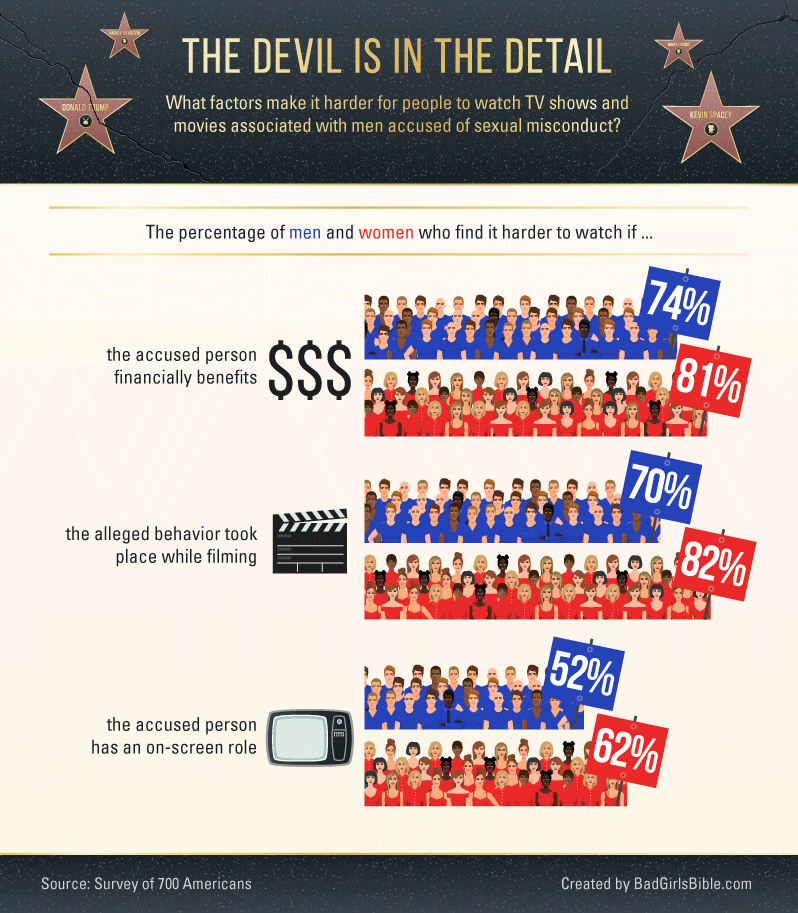
When a non-famous person is accused of sexual misconduct, his family, friends, and colleagues must decide to what extent they want to continue their relationship with him. In the case of a celebrity, that choice extends to potentially tens of millions of people across the world and is expressed through movie tickets, subscriptions to streaming services, and even passively watching reruns.
When the allegations against Bill Cosby hit the headlines in 2014, repeats of “The Cosby Show” were pulled by TV Land, and NBC and Netflix shelved projects involving him. By 2015, the formerly wholesome family show was off the air entirely and remained unaired until December 2016, when Bounce TV started re-airing it due to “popular demand.” A spokesperson for the network said “… research showed that African-American consumers see a distinction between Bill Cosby, the man, and the iconic TV character Cliff Huxtable.”
When we asked people what factors made them even less likely to watch a TV show or movie associated with a man accused of sexual misconduct, three main themes emerged. If the accused stood to benefit from the work financially, 78 percent of people said they would find it harder to watch their show or movie.
An almost identical proportion said it’d be more difficult to watch if an alleged incident took place during the same period the TV show or movie was filmed. And if the accused person had an on-screen role, as opposed to being behind the scenes as an executive, 57 percent of people would find the content harder to stomach. Each of these three aggravating factors had a larger effect on women’s propensity to keep watching than men’s.
One of the most publicized and hotly debated cases of a celebrity’s work being affected by sexual misconduct accusations is Oscar, Tony, and Golden Globe winner Kevin Spacey, who in October 2017 was accused of making a sexual advance on then-14-year-old actor Anthony Rapp. Fourteen others have since alleged similar abuse.
The Majority of People Think Kevin Spacey Deserves to Lose His Career
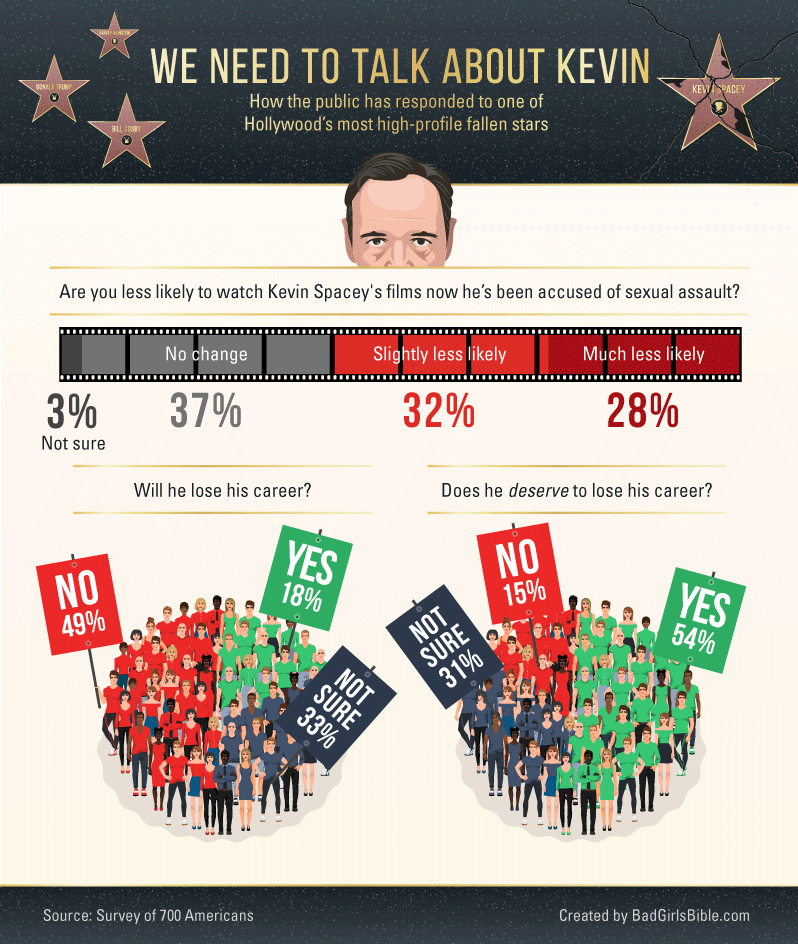
Kevin Spacey was one of Hollywood’s brightest stars and only weeks away from receiving an International Emmy Founders Award for his creative contributions to television when he was accused of drunkenly trying to seduce an underage actor at a house party in 1986. Within a little more than a week, 12 other men came forward with allegations that Spacey sexually harassed, assaulted, or attempted to rape them.
With Spacey slated to appear in several upcoming films, there was widespread uncertainty about how to proceed. Eventually, Ridley Scott reshot Spacey’s part as J. Paul Getty in “All the Money in the World” (spending over >$10 million to erase his presence), and his character was written out of the final season of “House of Cards.” Movie and TV studios understand the financial benefits and moral imperative of responding to allegations with actions against the alleged. But what does the public think?
Sixty percent of people said they were less likely to watch Kevin Spacey on screen now that he’s been accused of sexual misconduct, including 28 percent who said they were “much less likely.”
Netflix doesn’t publish viewing figures, but Nielson estimated 4.6 million people watched the season five premiere of “House of Cards.” Extrapolating our findings using this figure suggests Netflix made the right move axing Spacey, as between 1.3 million and 2.8 million people may have chosen to not watch Season 6 of “House of Cards” in response to the allegations.4 Of course, this doesn’t account for the morbid curiosity cohort – people who would have watched to see the drama unfold had he been kept in.
Earlier we saw that the majority of people thought Ben Affleck, James Franco, Stan Lee, Dustin Hoffman, Al Franken, and Louis C.K. would be forgiven for their alleged behavior. But what about Kevin Spacey? Only 26 percent believed he had a shot at forgiveness.
Being forgiven is different from working again, though. Forty-nine percent thought Spacey’s career would survive the scandal, 33 percent said they were not sure, and 18 percent said it was doomed. However, while almost half said they thought Spacey wouldn’t lose his career, just over half (54 percent) said he deserved to lose it. Only 15 percent said he didn’t deserve to lose his chance at working in Hollywood again.
The court of public opinion can be brutal, but with 15 named individuals making separate, shocking accusations against Spacey, it’s understandable why so many want his access to Hollywood revoked for good.
Women Are More Likely Than Men to Feel Sexual Misconduct Is as Common in Real Life as in Hollywood
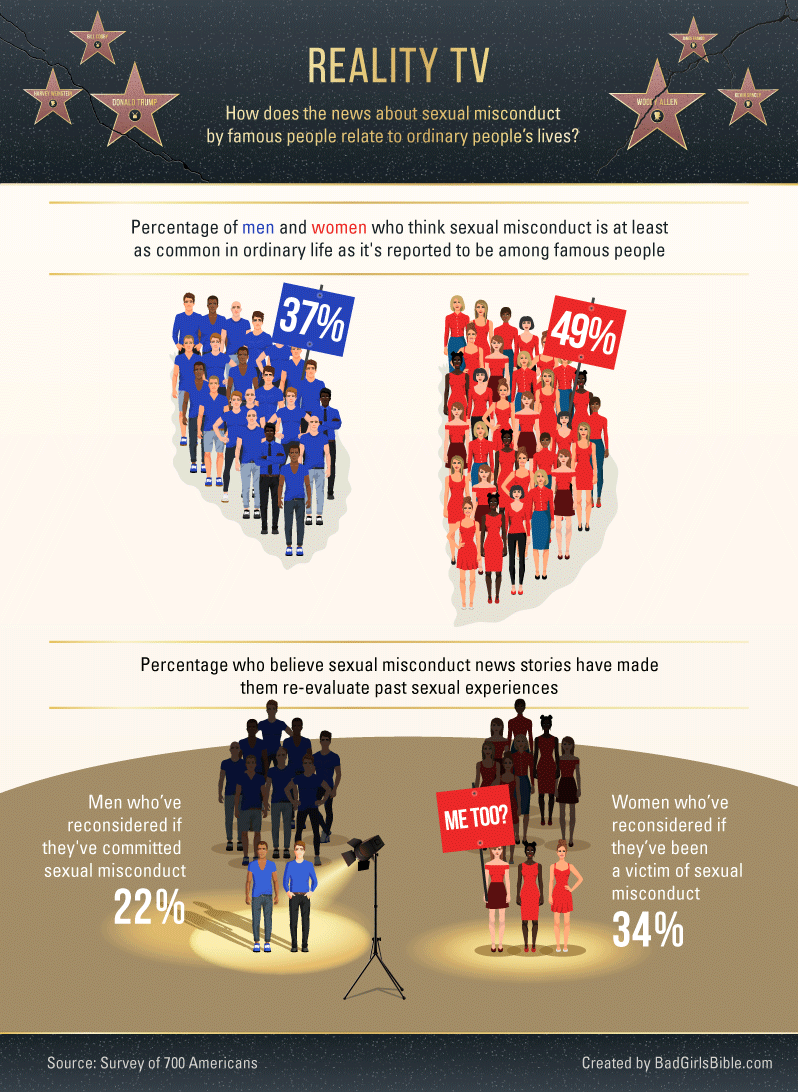
It’s hard for an average member of the public to consider the film and TV industries as representative of most normal people’s lives since they’re different by definition: full of rich, famous, beautiful people. Nevertheless, rich and famous people are still people living real, if not privileged, lives. So how does the prevalence of sexual misconduct differ between Hollywood Boulevard and Main Street? Are sexual assaults among the rich and famous rife compared to the rest of the population?
Forty-nine percent of women and 37 percent of men said they believed sexual misconduct was at least as common in “real life” as among famous people. Men were significantly more likely than women to say that sexual misconduct is more widespread in Hollywood than in day-to-day life (62 percent versus 48 percent). Public opinion once more appears divided. A recent survey by USA Today of 843 women who work in the entertainment industry revealed 94 percent experienced sexual harassment or assault during their careers, ranging from unwelcome sexual comments and jokes (87 percent) to appear naked for an audition unexpectedly (10 percent). Among our female respondents, 58 percent said they’d been victims of sexual assault. Other studies offer different numbers, which vary depending on how sexual assault is defined. Stop Street Harassment’s February 2018 nationwide survey said 81 percent of women reported “experiencing some form of sexual harassment and/or assault in their lifetime.”
It’s extremely difficult to compare Hollywood to the rest of the society, but whichever numbers we look at, the majority of women in both spheres reported experiencing unwanted sexual attention at alarming rates.
Time’s Up?
The Weinstein Effect has unearthed hundreds of cases of sexual misconduct in the entertainment industry, and there could be thousands more. As new allegations poured in during December 2017, four advertising professionals launched Rotten Apples, a searchable database containing media reports of sexual misconduct and impropriety allegedly committed by more than 19,000 actors, directors, producers, and others over decades. Hundreds of thousands of people have used it to check if a show or movie they once loved is now “rotten” thanks to the reported actions of its stars or makers. The site forms one small part of the mountain of media coverage that is ushering in a new era of accountability among media elites who once used power and influence to get their way.
We don’t know what the long-term effects will be, but there are signs that the Weinstein Effect is making people rethink their own experiences. Thirty-four percent of women surveyed said the scandals made them reconsider if they’d been a victim, while 22 percent of men reconsidered if their past actions were considered sexual misconduct.
Here’s hoping that time finally is up for once-untouchable sexual harassers and abusers both within Hollywood and beyond its hills.
About the Survey
700 Americans were recruited to answer questions on the sexual misconduct scandals in the entertainment industry. Respondents had no affiliation with or knowledge of BadGirlsBible.com that could potentially bias their answers. Their ages ranged from 19 to 73. Fifty-four percent were female, and 46 percent were male. Those who said they had no knowledge at all of the recent scandals (1 percent) were not asked further questions about celebrities. Only people who knew something about the allegations against each of the 20 selected famous men were asked to give favorability ratings. For more information on how we asked questions and interpreted answers, contact [email protected]
References
- Based on BuzzSumo.com’s “Most Shared” Search, February 2018
- https://www.cbsnews.com/news/metoo-more-than-12-million-facebook-posts-comments-reactions-24-hours/
- http://news.gallup.com/poll/15370/party-affiliation.aspx
- 1.3 million is based on the proportion of people who said they were “much less likely” to watch Spacey post-allegations (28 percent). 2.3 million counted people who said “slightly less likely” or “much less likely” (50 percent). These figures should only be considered indicators; no one knows what would have happened if Spacey was kept by Netflix.
Fair Use Statement
BadGirlsBible.com would love for you to spread the message of this research with the world. Feel free to use the images for noncommercial purposes. All we ask is that you link back to this page to give credit to the research team and readers access to our full findings.

I was hoping the study went deeper than just numbers. Some theories about what is going on or what makes people believe as they do would help shed some light on this situation, with some conclusions. Where is this all going? Is it just a changing line as Governor Andrew Cuomo contends or have men been getting away with the abuse of power in the sexual arena for eons?